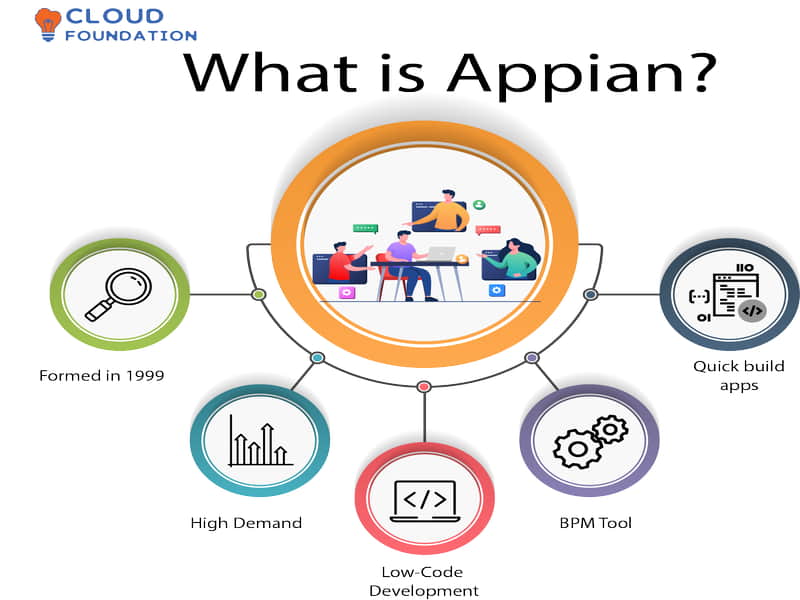What is Appian?
What is Appian?
Appian stands out as a low-code development platform. Its unique advantage is its visual drag-and-drop design tools and minimal code requirement, which make app creation a breeze.
Appian’s versatility shines through, catering to both technical and non-technical users. It features powerful business process management (BPM), rules engines, and integration support across systems and data sources, making it the ideal platform for efficient task handling.
Appian BPM engine lets users model and automate complex business processes quickly, streamlining workflows to increase efficiency.
The rules engine is a standout feature. It enables users to design, enforce, and monitor application rules, ensuring they function strictly as intended. Prebuilt templates and components further expedite the app-building process.
This helps businesses quickly create unique applications without investing heavily in development staff or infrastructure, without needing an army of developers and complex development environments.
Non-technical users can build apps using its drag-and-drop interface, abstracting away most coding complexity, which is perfect for enterprises of any size across many industries.
However, Appian also powers robust solutions suitable for professional developers, making this versatile solution for enterprises of any type or size across various vertical markets.
Appian offers mobile and online deployment options to give users access to their apps from any location.
Its security features, such as role-based access control and data encryption, protect apps and data while helping businesses build unique apps quickly and cost-effectively without investing in infrastructure or development personnel.

Define Appian
Appian is a low-code development platform that offers an easy, visual user experience for designing, building, and deploying custom applications.
Suitable for technical and non-technical users alike, Appian allows them to design complex apps quickly with minimal coding effort.
Appian offers features like its robust business process management (BPM) engine, powerful rules engine, integration support across various systems/data sources, and prebuilt templates/components to speed development efforts quickly and seamlessly.
It is a highly flexible platform suitable for organisations of any size and industry, from startup businesses to multinational enterprises.
Support for mobile and web-based deployments allows users to access apps from any location, while security features such as role-based access control and data encryption provide added layers of protection for applications and data.
Overall, Appian serves as an efficient tool. Organisations looking for fast application creation without considerable infrastructure investments or development resources should look no further than Appian.
Overview of Appian
This Appian offers an in-depth introduction and overview of its low-code development platform, detailing all its key features and capabilities.
It details how to utilise Appian’s visual interface for application design and build and its business process management (BPM) engine for modelling business processes.
Its rules engine for creating rules enforcement logic, integrating Appian with other systems/data sources, deploying/management procedures, and introducing the concept of low-code development.
Appian provides users with an accessible solution for building custom applications quickly and effortlessly without extensive coding expertise or large teams of developers.
This Appian covers best practices, tips, and tricks for extracting maximum benefit.
Bythe time users finish this class, they should possess an excellent knowledge of Appian as a means of building applications explicitly tailored for projects and organisations.
It also serves new and experienced Appian users, equipping them with all the knowledge and abilities required to launch custom applications with minimal code.
What Does Appian Do and How to use Appian?
Appian is a low-code development platform that enables users to build custom apps with little coding required rapidly.
Appian’s visual interface, business process management, rules engine, and prebuilt templates and components work together to automate business processes, manage cases or incidents, and transform manual processes into digital workflows, saving time and resources.
Have you ever wondered what an Appian developer is and what they do? Appian is ideal for organisations that need custom applications quickly and effortlessly without requiring extensive teams of developers or significant infrastructure investments.
Appian abstracts away much of its underlying code complexity so non-technical users can build apps using its simple drag-and-drop interface.
Yet its power satisfies professional developer demands, making this versatile solution suitable for organisations of any size across various industries.
Appian’s Business Process Management (BPM) engine empowers users to model and automate complex business processes while streamlining workflows for increased efficiency.
Appian includes an effective Rules Engine that enables users to set and enforce business logic within applications, so they behave according to plan.
In addition, Pre-built Templates and Components make Appian an efficient platform that quickly builds standard application features without extensive coding knowledge or deep knowledge of the underlying technology, saving valuable time for development purposes.
Appian is invaluable to organisations looking to quickly build custom applications without investing significant infrastructure or development resources.
Offering various features and functionalities that assist users in quickly creating the desired applications with no coding needed for completion, Appian makes creating customised apps fast and effortless.

What are BPM Tools?
BPM tools assist companies with modelling, automating, and optimising their business processes.
Most BPM solutions feature visual interfaces for planning process models and features to execute and monitor them. These solutions also come in handy in other capacities, like data collection for management or analysis purposes.
BPM solutions may also serve other purposes. For instance, they could help track customer orders more effectively and create reports.
BPM solutions may be utilised for:
Corporate Process Automation: BPM systems may streamline corporate operations to increase productivity while simplifying workflows and streamlining processes.
Case and Incident Management: Case/incident management features like tracking progress reports, assigning tasks for task delegation, and engaging team members directly within these tools can streamline workflows further and enhance team member participation in managing cases and incidents effectively.
Digital Process Transformation: These systems can digitise paper-based or manual processes to increase efficiency while decreasing errors.
Business Process Optimisation: By employing BPM technologies to monitor processes closely, business process optimisation technologies can quickly detect bottlenecks, reduce expenses, and maximise performance levels.
BPM software is utilised by companies of all sizes and across numerous industries. It is especially suited for firms that streamline workflows, optimise business processes, and reduce errors.

Appian Training

How Does Appian Work?
Appian’s low-code development platform empowers users to rapidly create apps tailored specifically for them with its visual app design interface and business process management features.
Its advantages include business process monitoring capability, rules engine, and prebuilt templates and components.
Appian provides users with an interactive visual interface for developing applications. It uses drag-and-drop techniques to manage forms, data sources, and business rules.
Appian automatically generates code as it works so users can focus on design and functionality instead.

Users can deploy applications developed in Appian across on-premise, cloud and hybrid environments after completion of development.
Appian can then manage and monitor programs to track usage patterns, identify errors quickly and update accordingly.
It has a visual interface for quickly designing apps without writing code, automatically generating code to build them without difficulty.
With Appian, you can build apps quickly without worrying about code syntax errors. Use business process management, rules engine, and prebuilt templates and components to build apps rapidly without programming.
After completion, the applications can be deployed across various environments and maintained and monitored using its tools.
Why Appian and What are its Benefits of Appian?
Appian’s low-code development platform enables users to create custom apps rapidly. It features an interactive visual design environment for app design and development and business process management features like process mapping.
In addition, Appian comes equipped with prebuilt templates and components, which is an additional advantage.

Appian offers many benefits:
Speed and Efficiency: It allows consumers to create apps rapidly without coding, enabling businesses to design and deploy apps quickly to accommodate changing business needs.
Accessibility: Both technical and non-technical users can build unique apps with Appian.
Flexibility: Appian offers on-premises, cloud and hybrid deployment options so companies can select their optimal option.
Integration: It allows organisations to integrate multiple systems and data sources to create apps that simultaneously alter data from various sources.
Security: Role-based access control and data encryption ensure the safekeeping of apps and data in Appian.
Appian is an invaluable asset for enterprises that wish to develop applications quickly and cost-efficiently without hiring large development staff and incurring substantial infrastructure investments.

Appian Online Training

What is Appian software and how to use How to use Appian
Appian software provides customers with an efficient low-code development platform to build new apps with little code needed quickly.
It includes a visual interface for designing applications,as well as business process management features like rules engines and prebuilt templates and components to facilitate rapid application creation.
Appian users start by building their application using its visual interface. Drag-and-drop features such as forms, data sources and business rules to add and rearrange features like forms.
Appian automatically creates the underlying code as users add pieces, allowing them to focus on designing their application’s aesthetic and functional needs instead.
Once an application is finished, customers can deploy it across any setting, including on-premises, cloud, and hybrid environments.
Appian also features monitoring capabilities so users can measure usage patterns and identify problems, enabling updates to be implemented promptly as necessary.

Appian Features
Appian is a low-code development platform that empowers users to rapidly and effortlessly build custom applications with minimum coding effort.
It includes numerous capabilities that facilitate rapid application creation, such as:
Visual Interface: This provides a visual interface for application design and development, enabling users to build customised apps quickly through drag-and-drop.
Business Process Management: It comes equipped with a business process management (BPM) engine, enabling users to automate and model complex business processes that could improve efficiency while streamlining workflows.
Rules Engine: Appian features a rules engine that enables users to create and enforce business rules and logic within their applications. This helps ensure that apps function as intended and that users get precisely the planned application functionality.
Integration: This can integrate seamlessly with multiple systems and data sources, enabling developers to build applications that simultaneously access and manipulate information from various sources.
Deployment options: Appian offers various deployment options, enabling organisations to choose one that most suits their requirements. These options include on-premises, cloud, or hybrid environments.
Appian allows organisations to adapt their deployment strategy accordingly as their needs shift or change over time.
Monitoring and management: Its applications can be monitored and managed remotely, allowing usage tracking, issue diagnosis, and the implementation of updates as needed.
Appian provides organisations needing custom applications with an invaluable solution quickly without requiring expensive infrastructure investments or large development teams.
Its vast capabilities enable users to develop applications with minimum scripting efforts,allowing organisations to respond more rapidly and flexibly as business requirements change.
What are the Prerequisites of Appian?
Adopting Appian as a low-code platform for developing custom applications has few prerequisites; its goal is to be user-friendly and not require users to have prior programming or software development skills.
Appian users new to Appian may benefit from possessing some fundamental knowledge and abilities. This may include:
Fundamental computer skillsare needed for users to feel at home operating a computer and browsing websites using web browsers.
You should have in-depth knowledge of business processes and how they operate, which will assist customers in understanding Appian’s BPM engine and modelling and automating them.
You should have a deep knowledge of data management, including concepts like sources, structures, and relationships between data sets.
This will enable customers to use Appian’s data management tools effectively and integrate them with external systems or sources.

Experience in web programming isn’t essential when using Appian to develop web-based apps; however, it could prove extremely valuable. This may encompass HTML/CSS/JavaScript elements.
Few prerequisites exist to utilise Appian; its platform aims to equally accommodate technically competent and non-technical users.
Beginning Appian users will benefit from general computer skills and experience with business processes, data management, and web development.
What are the best ways to learn Appian?
Appian offers two main learning techniques: Self-Paced Training and Instructor-Led Live Training.
Instructor-Led Live Training: Instructor-led live Training provides users an online learning experience. You will attend live training sessions virtually with Appian-certified instructors. The sessions cover subjects such as developing applications with Appian, using its BPM engine and rules engine, and more.
Instructor Live Training offers users looking for structured learning environments under the guidance of knowledgeable teachers an advantageous alternative option.
Self-Paced Training: In self-paced training mode, users can complete flexible self-guided learning experiences at their tempo (How fast they perform an exercise) through online modules and resources.
Modules cover numerous subjects and can be completed whenever suits you, making Self-Paced Training the perfect solution for accommodating diverse schedules while learning quickly.
Appian provides two practical learning approaches: instructor-led live training and self-paced training. Both allow you to select the one that best meets your learning style and expectations.

Appian Course Price


Saniya
Author